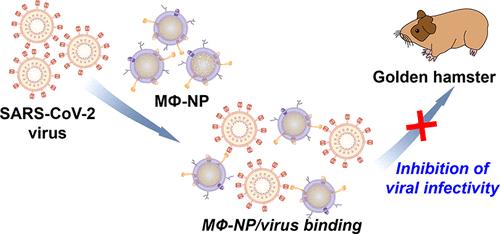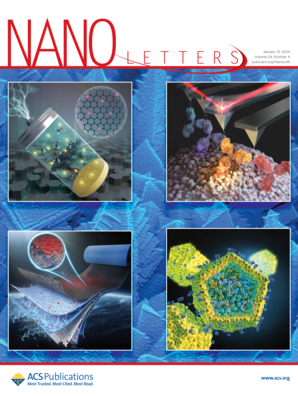Cellular Nanoparticles Treat Coronavirus Infection in Vivo
IF 9.6
1区 材料科学
Q1 CHEMISTRY, MULTIDISCIPLINARY
引用次数: 0
Abstract
Cellular nanoparticles (CNPs), which refer to nanoparticles coated with natural cell membranes, are promising for neutralizing pathological agents. Here, we use CNPs as a medical countermeasure against the infection of SARS-CoV-2 variants in an animal model. CNPs comprise polymeric cores coated with the plasma membranes of human macrophages. The resulting nanoparticles (MΦ-NPs) act as host cell decoys to intercept SARS-CoV-2 and block its cellular entry, thus inhibiting subsequent viral infection. Our findings indicate that MΦ-NPs bind to the spike proteins of SARS-CoV-2 variants in a dose-dependent manner and inhibit the infectivity of live viruses. In hamsters infected with SARS-CoV-2 variants, MΦ-NPs significantly reduce the viral burden in the lungs, demonstrating their effectiveness in inhibiting viral infectivity in vivo. Furthermore, MΦ-NPs are primarily taken up by alveolar macrophages without inducing noticeable adverse effects. Given the crucial role of macrophages in viral infections, MΦ-NPs present a promising approach to combating emerging viral threats.

细胞纳米颗粒治疗体内冠状病毒感染
细胞纳米粒子(CNPs)是指涂有天然细胞膜的纳米粒子,具有中和病原体的前景。在这里,我们利用 CNPs 作为医疗对策,在动物模型中对抗 SARS-CoV-2 变体的感染。CNPs 由涂有人类巨噬细胞浆膜的聚合物核心组成。由此产生的纳米颗粒(MΦ-NPs)可作为宿主细胞诱饵拦截 SARS-CoV-2 并阻止其进入细胞,从而抑制病毒的后续感染。我们的研究结果表明,MΦ-NPs 能以剂量依赖的方式与 SARS-CoV-2 变体的尖峰蛋白结合,抑制活病毒的感染性。在感染了 SARS-CoV-2 变体的仓鼠身上,MΦ-NPs 能显著减少肺部的病毒负荷,证明了其在体内抑制病毒感染的有效性。此外,MΦ-NPs 主要被肺泡巨噬细胞吸收,不会引起明显的不良反应。鉴于巨噬细胞在病毒感染中的关键作用,MΦ-NPs 为应对新出现的病毒威胁提供了一种前景广阔的方法。
本文章由计算机程序翻译,如有差异,请以英文原文为准。
求助全文
约1分钟内获得全文
求助全文
来源期刊

Nano Letters
工程技术-材料科学:综合
CiteScore
16.80
自引率
2.80%
发文量
1182
审稿时长
1.4 months
期刊介绍:
Nano Letters serves as a dynamic platform for promptly disseminating original results in fundamental, applied, and emerging research across all facets of nanoscience and nanotechnology. A pivotal criterion for inclusion within Nano Letters is the convergence of at least two different areas or disciplines, ensuring a rich interdisciplinary scope. The journal is dedicated to fostering exploration in diverse areas, including:
- Experimental and theoretical findings on physical, chemical, and biological phenomena at the nanoscale
- Synthesis, characterization, and processing of organic, inorganic, polymer, and hybrid nanomaterials through physical, chemical, and biological methodologies
- Modeling and simulation of synthetic, assembly, and interaction processes
- Realization of integrated nanostructures and nano-engineered devices exhibiting advanced performance
- Applications of nanoscale materials in living and environmental systems
Nano Letters is committed to advancing and showcasing groundbreaking research that intersects various domains, fostering innovation and collaboration in the ever-evolving field of nanoscience and nanotechnology.
 求助内容:
求助内容: 应助结果提醒方式:
应助结果提醒方式:


